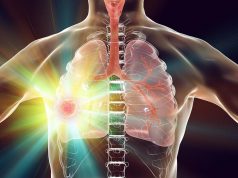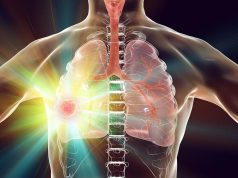Benefit not significant for aspirin use in patients with non-small cell lung cancer undergoing SBRT
MONDAY, Sept. 23, 2019 (HealthDay News) — Nonsteroidal anti-inflammatory drugs (NSAIDs) are correlated with better overall survival in patients with head and neck squamous cell carcinoma (HNSCC), and there is a nonsignificant benefit for aspirin use in non-small cell lung cancer (NSCLC), according to two studies presented at the annual meeting of the American Society for Radiation Oncology, held from Sept. 15 to 19 in Chicago.
Austin J. Iovoli, M.D., from the Jacobs School of Medicine and Biomedical Sciences in Buffalo, New York, and colleagues performed a retrospective review of HNSCC patients treated with definitive chemoradiation to examine the effect of NSAID use. Data were included for 460 patients; 44 percent were taking NSAIDs during treatment. The researchers found that NSAIDs correlated with better overall survival (OS) in univariate analysis. After backward selection adjustment for potentially confounding factors, the correlation between NSAID use and better OS persisted.
Gregory Hermann, M.D., M.P.H., from the Roswell Park Comprehensive Cancer Center in Buffalo, New York, and colleagues examined the effect of aspirin on patients with NSCLC undergoing stereotactic body radiation therapy (SBRT). A total of 164 patients were eligible at a median follow-up of 18.2 months. Of these, 45 percent were taking NSAIDs (95 percent aspirin) at the time of SBRT. The researchers found that OS did not differ significantly for concurrent NSAID use versus no use. A nonsignificant OS benefit was seen favoring concurrent aspirin use versus no aspirin use (log-rank P = 0.057).
“Although clinical trials are needed to make a definitive recommendation, we encourage patients to have a discussion with their doctor regarding the risks and potential benefits of aspirin use,” Hermann said in a statement.
One author from the Iovoli study disclosed employment with Northwell Health.
Copyright © 2019 HealthDay. All rights reserved.








